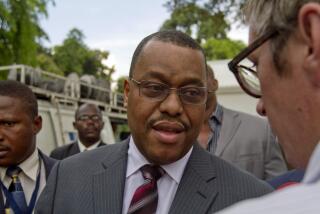ELECTIONS : A Real Choice for Haiti’s Voters : Radical priest, economist lead race to become first freely elected president.
- Share via
PORT-AU-PRINCE, Haiti — A radical Roman Catholic priest, whose revivalist campaign against foreign aid and traditional institutions has frightened the middle class but captivated the masses of urban poor, and a pragmatic former World Bank economist, favored by the United States and other aid-giving countries, have emerged as front-runners in troubled Haiti’s first free democratic presidential election Sunday.
Voters are scheduled to choose among 11 presidential candidates as well as hundreds of aspirants for Senate, National Assembly and local offices.
For the record:
12:00 a.m. Dec. 21, 1990 For the Record
Los Angeles Times Friday December 21, 1990 Home Edition Part A Page 3 Column 5 Metro Desk 2 inches; 44 words Type of Material: Correction
Haiti--A photograph of the wrong man was published with a Dec. 15 preview of last Sunday’s elections in Haiti. It did not show leading presidential candidate Marc Bazin, as it should have, but Gerard Bissainthe, a New York City College professor who served as a minor Cabinet minister in a recent Haitian government.
Only Father Jean-Bertrand Aristide, 37, a slum priest who has survived three assassination attempts and scorned efforts by church superiors to discipline him, and Marc Bazin, 58, who has spent five years systematically building a grass-roots political organization, appear capable of gaining either a clear first-round majority or a place in a two-man runoff next month if neither takes more than 50% of the vote.
The winner will take office Feb. 7, the fifth anniversary of the flight of former dictator Jean-Claude (Baby Doc) Duvalier.
The soft-spoken Aristide, physically unimposing at a slender 5 feet, 4 inches tall, exudes an almost charismatic power when he preaches against rampant injustice and lingering Duvalierism in this poorest country of the hemisphere. Promising lavalas (flash floods) at thepolls, he is almost mystically confident, refusing to concede even the possibility that he could lose.
“I will not lose,” he has said repeatedly during campaign press conferences in which he drew favorable parallels between himself and Jesus. He said he will give up the priesthood when he takes power.
Aristide was expelled by his Salesian order two years ago when he refused to tone down provocative calls for popular justice against remnants of the Tontons Macoutes, the militia that kept the Duvalier family in power for 29 years. The Tontons Macoutes, with army backing, have been blamed for numerous acts of political violence that frustrated previous efforts to hold democratic elections.
Many Haitians also blame the Tontons Macoutes for the only major act of political violence so far in this campaign, when a fragmentation grenade thrown into a crowd at an Aristide rally Dec. 5 killed seven people and wounded more than 50.
Otherwise, the campaign has been remarkably peaceful, owing to an army pledge of neutrality and the presence of foreign observers from the United Nations, the Organization of American States and a number of private groups, including former President Jimmy Carter’s Council of Freely Elected Heads of Government.
Bazin, too, is confident, but he concedes a strong possibility that the race will go to a runoff Jan. 20. His campaign has been a largely unemotional recitation of practical economic and social solutions to the country’s massive problems.
Bazin--a reformer who gained the nickname “Mr. Clean” when he tried unsuccessfully to root out corruption in Haiti’s Finance Ministry in 1982--said he is counting on the reach of his National Alliance for Democracy and Progress into rural areas, where 75% of Haiti’s 2.7 million registered voters live, to provide the edge. The articulate, multilingual economist claims the support of local notables such as mayors, physicians, religious figures and others whose lead rural voters have traditionally followed.
He also has been strengthened by the fear of Aristide among the country’s organized institutions--the churches, the army, the business and professional communities--and most farmers and middle-class city dwellers.
To his impoverished followers, many of them too young to vote, Aristide’s unwavering assumption of victory has been so convincing that it is widely feared they will erupt in violence rather than accept anything less.
“He’s a cross between the Ayatollah and Fidel Castro,” said a leading businessman, echoing a widely shared middle-class assessment of Aristide’s appeal to the poor. “If he wins, his followers will think he’s Robin Hood and take it as a signal to start a free-for-all. If he loses they’ll claim fraud and try for mob rule. Either way there’s going to be bloodshed.”
More to Read
Sign up for Essential California
The most important California stories and recommendations in your inbox every morning.
You may occasionally receive promotional content from the Los Angeles Times.










